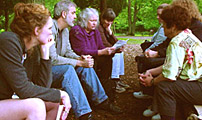The first goal of Algonkian is to provide our writers with the knowledge it takes to intelligently approach the planning and writing of a first novel. The second goal is to get them represented by a good agent.
 Over the years, we've found that writers who can't get published all make the same mistakes or manifest the same self-defeating behaviors. Writers who have the potential to get published also share a few things in common: they understand the market, the art of fiction craft, and just as importantly, their strengths and weaknesses as writers. Also, more often than not, they possess credentials the market is looking for, i.e., they have published short fiction in respected journals, or else their career background provides them with a validity that makes publishers feel comfortable.
Over the years, we've found that writers who can't get published all make the same mistakes or manifest the same self-defeating behaviors. Writers who have the potential to get published also share a few things in common: they understand the market, the art of fiction craft, and just as importantly, their strengths and weaknesses as writers. Also, more often than not, they possess credentials the market is looking for, i.e., they have published short fiction in respected journals, or else their career background provides them with a validity that makes publishers feel comfortable.
 In summary, if you are willing to do what it takes to get published, you have a darn good chance of succeeding, cause the good news is, agents and publishers are starving for new work. Which brings us around again to the second goal of Algonkian: to get our writers published. The more first-time authors we can get represented by quality agents, and subsequently published, the better it is for us. This goal has become more and more realizable over the past year due to our agent contacts and affiliations with the literary arts site, WebdelSol.Com. Agencies in working relationship with Algonkian currently include ICM, Trident Media, B.J. Robbins, Amster Literary, Erin Reel Agency, William Morris, Goldfarb and Associates, and Graybill and English. Read our agent interviews and get to know a few.
In summary, if you are willing to do what it takes to get published, you have a darn good chance of succeeding, cause the good news is, agents and publishers are starving for new work. Which brings us around again to the second goal of Algonkian: to get our writers published. The more first-time authors we can get represented by quality agents, and subsequently published, the better it is for us. This goal has become more and more realizable over the past year due to our agent contacts and affiliations with the literary arts site, WebdelSol.Com. Agencies in working relationship with Algonkian currently include ICM, Trident Media, B.J. Robbins, Amster Literary, Erin Reel Agency, William Morris, Goldfarb and Associates, and Graybill and English. Read our agent interviews and get to know a few.
 The purpose of our Algonkian guide and craft manual, "Immersed in The Art of Fiction," is to provide you with a week's worth of craft knowledge as well as reference material you can use long after the workshop is finished. We immerse into drama and structure, work our way into an understanding of "The Art of Fiction," and then finally, we explore the nuances of narrativeŚcause if you can't connect the word dots in the right way, or if your narrative waxes insipid from lack of imagination, emotion, or intellectual content, you've lost your reader.
The purpose of our Algonkian guide and craft manual, "Immersed in The Art of Fiction," is to provide you with a week's worth of craft knowledge as well as reference material you can use long after the workshop is finished. We immerse into drama and structure, work our way into an understanding of "The Art of Fiction," and then finally, we explore the nuances of narrativeŚcause if you can't connect the word dots in the right way, or if your narrative waxes insipid from lack of imagination, emotion, or intellectual content, you've lost your reader.
 In the creation of our manual, we've endeavored to use authors and works considered by most critics to be classic in their brilliance. Our authors are immediately recognizable, and as a bonus, they prove the points we're trying to make. We firmly believe that one can only learn the art of fiction craft via analysis and emulation, i.e., you study and then apply the craft technique to your own work.
In the creation of our manual, we've endeavored to use authors and works considered by most critics to be classic in their brilliance. Our authors are immediately recognizable, and as a bonus, they prove the points we're trying to make. We firmly believe that one can only learn the art of fiction craft via analysis and emulation, i.e., you study and then apply the craft technique to your own work.
And one more thing. While we're discussing what it takes to get published, let's not forget a little thing called PASSION.





